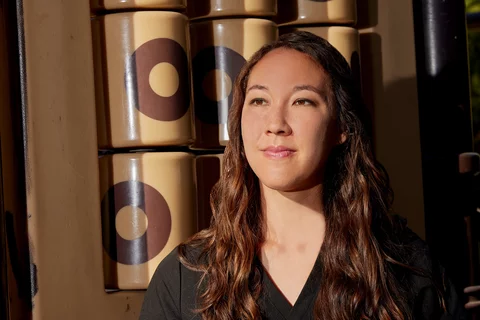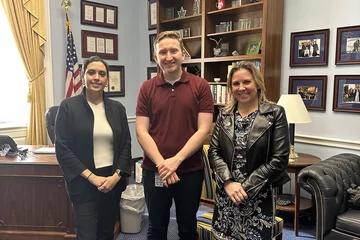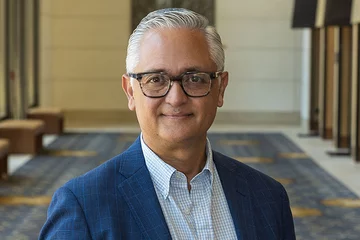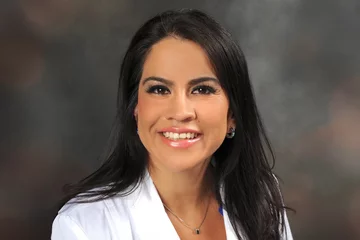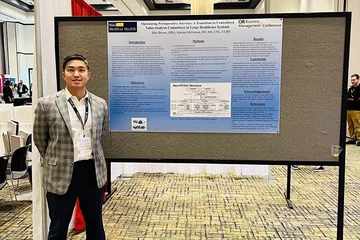You might say that Kristen Choi M.S. ’18 backed into nursing. “I sort of chose it last-minute during my last year of high school,” she admits, “because I wanted a job that would combine math and science with meaningful human relationships.”
It’s worked out well for her — and for UCLA. Now an assistant professor of nursing and public health, Choi earned a doctorate so she could use science to address some of the systemic problems she observed in mental health care. Today, in addition to teaching, continuing her research and practicing inpatient child psychiatry, she’s become a sought-after expert tackling some of the most vexing issues facing modern health care.
In 2020, you became one of the first nurses to ever be featured on the Forbes “30 Under 30 in Health Care” list.
- Definitely a huge honor. It was especially meaningful because 2020 was a difficult year to be a nurse. Nurses faced extremely challenging working conditions during the pandemic and risked their lives to care for patients. Many people came to realize for the first time what nurses did, how important they were in our health care system.
Nurses were definitely the backbone of getting through this pandemic. Not even just for the disease itself, but the mental health issues that followed.
- In the first year, we were so laser-focused on COVID-19 itself that we didn’t think about the secondary effects: pandemic stressors, economic difficulties, grief and loss, social isolation.
It led to a better appreciation for nursing. But do you think that this is something that will continue past the pandemic, or are people’s memories short-lived?
- Good question. One of the most uplifting things about the pandemic for me was seeing that applications to nursing schools and to public health programs have been off the charts across the country. Many young people now want to go into careers in epidemiology, infectious disease, medicine, public health or nursing. That’s very encouraging — we need their ideas and energy.
How can we make sure that we’re taking care of our nurses?
- You and your loved ones are less likely to die or have complications in a hospital if the nurses that are taking care of you are well-rested, not working excessive hours, not short-staffed and not overloaded with patients. You’re more likely to survive your hospitalization when your nurses are given the tools they need to care for you. We need to do a better job of communicating this message to health care and policy leaders. It’s in the best interests of the public to have a healthy nursing workforce.
In your view, what are the biggest issues facing our health care system today?
- We still have a lot of problems around access and cost. There are many people who can’t get the kinds of health care they need when they need it, and that’s especially true in mental health. About 1 in 3 Americans lives in a designated mental health provider shortage area. So, we end up having a mental health system that only has the capacity to manage crises. Even for people who have health insurance, mental health care access may be limited based on the kind of insurance they have. It’s often difficult for people with public insurance to access mental health providers and therapists.
What drew you to mental health and psychiatry, specifically?
- One was personal. My family was involved in foster care when I was in high school and college. I really got to see firsthand how damaging trauma was to kids, how much it affected their mental and emotional health even at a very, very young age. The other was just based on clinical experiences. I saw that people who had mental illness were treated differently. They were treated with so much stigma and judgment and blame. One of my first clinicals as a nursing student was in a psychiatric unit. It was obvious to me that there were significant gaps in mental health care. So, I was interested in studying childhood trauma, its influence on mental health and how we can better design health care systems to be more responsive.
2020 was a difficult year to be a nurse. Nurses risked their lives to care for patients. Many people came to realize for the first time how important they were in our health care system.
What problems with mental health emerged in the pandemic?
- Telehealth was an important innovation during the pandemic. But while I’m excited to see technology being leveraged in mental health care, the majority of telehealth models I have seen are being used to increase options for the people who already had access to care — but not to reach previously unengaged or underserved populations. That’s a concern, because we might actually be making disparities in mental health care worse. We need to consider how we can leverage technology in mental health care with a lens toward equity.
What drew you to studying vulnerable groups?
- I have seen firsthand the way marginalized groups of people — including people of color, people who are undocumented, people who are LGBTQ, people who are homeless, and others — are denied access to safe, high-quality, affordable and timely mental health care, over and over. These inequities have informed the direction of my research on how we can improve mental health care such that we close disparities in mental health outcomes.
What other problems are there that maybe no one is really talking about?
- One problem we still have not addressed adequately is firearm injury and violence. About two-thirds of firearm-related deaths in our country are suicides. Firearm-related suicides increased during COVID-19, as did other forms of firearm violence. Another major problem is substance use disorders. Treatment often occurs in a silo. I’d also like to see us grow our mental health workforce.
Every day we’re bombarded by terrible news. What are all of these anxiety-inducing events doing to our mental health?
- It’s really hard. We’re living in a challenging time. The stressors can lead to numbness about more reports of bad news. We can start to feel apathetic or powerless to make change in the face of big problems that don’t have an easy solution. For people who are struggling with current events, it’s important to reach out for help.
Do you think there’s any reason for optimism?
- Yes. I think that we can get to a better place. I wouldn’t be working in this area if I thought it was truly hopeless. I am excited about innovations happening on a local level, and about seeing less stigma around mental illness in younger generations. And I expect that nurses will play a big role.
This article was originally published in the latest edition of the UCLA Magazine.
